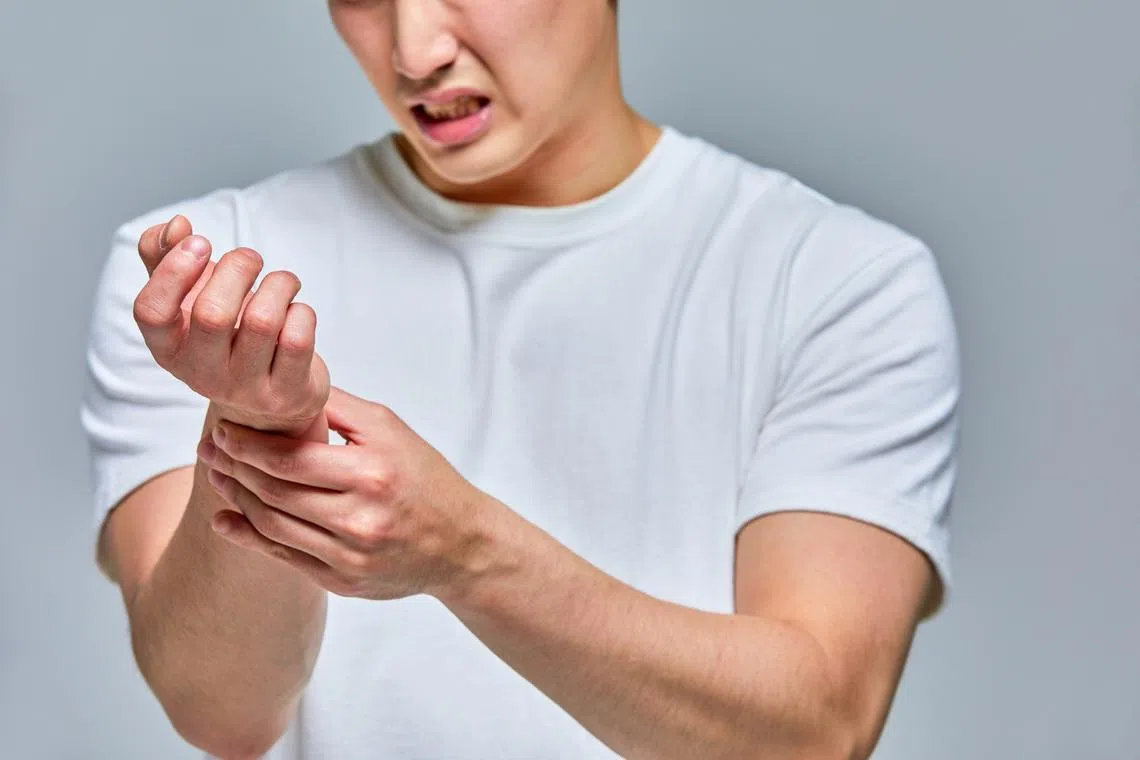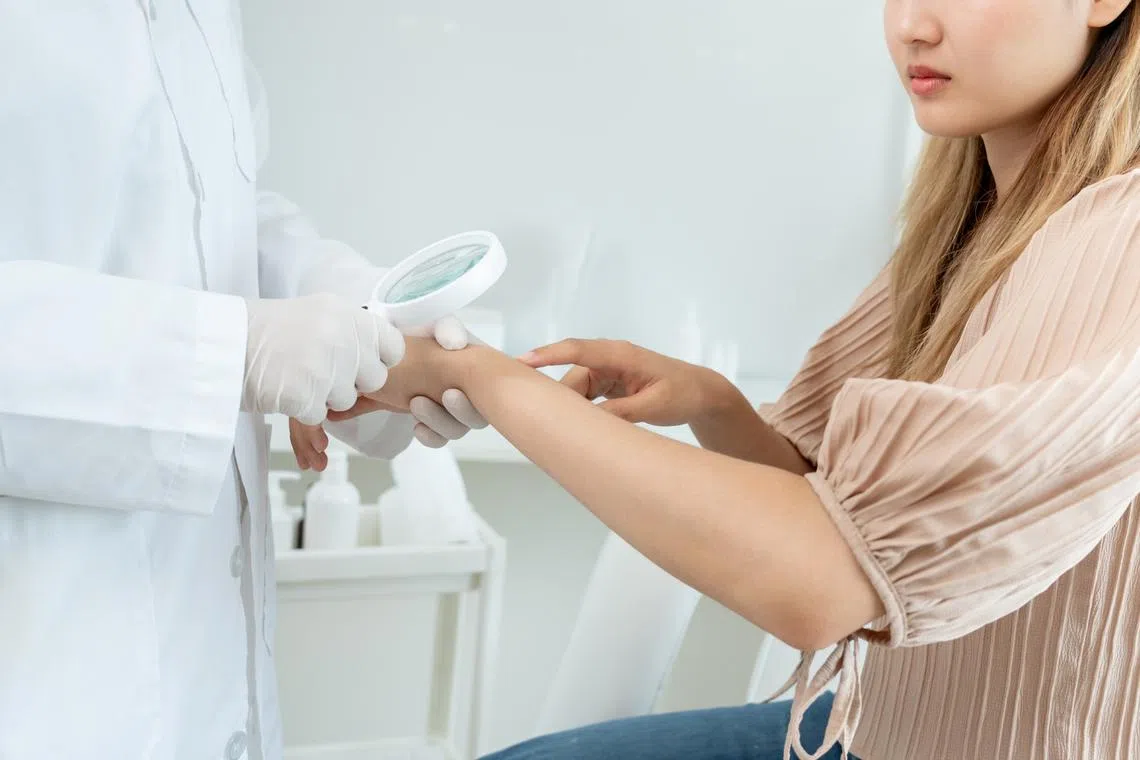BRANDED CONTENT
Relief for eczema flare-ups: How to manage symptoms if your skin condition worsens
When conventional treatments for moderate to severe atopic dermatitis become less effective, targeted therapies may offer much-needed help

A weakened skin barrier allows irritants and allergens to penetrate, triggering the body’s immune response and causing atopic dermatitis.
PHOTO: GETTY IMAGES
Since his earliest memories, Mr Sam Tan (not his real name) has had to live with rashes alongside dry and itchy skin on his legs.
Though the symptoms first appeared when he was just a toddler, the 25-year-old remembers the confusion and frustration that marked his childhood. “I always wondered why I had it and other kids didn’t,” he says, referring to the signs of atopic dermatitis, commonly known as eczema, a chronic skin condition.
Eczema affects up to 20 per cent of school-going children 11 per cent of adults in Singapore
In mild cases of atopic dermatitis, the affected areas are limited to a small part of the body, which may appear dry and mildly red.
“The condition is usually tolerable and nothing more than a mild annoyance,” says Prof Lee. “However, in moderate to severe cases, the extent of skin affected is significantly higher, and lesions can be bright red, wet and oozy, and itchy.”
Patients with eczema, he adds, have a genetically weakened skin barrier, which makes it easier for irritants and allergens to enter the skin1. When that happens, it activates the body’s immune response, which results in atopic dermatitis.
With time, the skin may become scaly and leathery due to constant scratching or rubbing.
Typically, most children with eczema will experience an improvement in their skin condition as they get older, but about 30 to 40 per cent of them continue to face symptoms as adults
Targeted treatments for moderate to severe atopic dermatitis
Moisturisers play a key role in healing the skin’s damaged barrier, making them essential for patients with eczema, Prof Lee says.
Prescribed topical medications, such as steroid creams, can also help reduce inflammation, he adds, and these can be combined with other oral treatments.
“Those with atopic dermatitis should identify their triggers. These can differ for each individual, but common triggers of eczema flare-ups include heat, dust, humidity and stress.”

As patients react differently to atopic dermatitis treatments, dermatologists assess their conditions, medical history and other factors before providing options.
PHOTO: GETTY IMAGES
Mr Tan, whose eczema eventually spread to his whole body as he grew older, found that activities like basketball, which left him hot and sweaty, worsened his symptoms. These caused more rashes and discomfort, and frequent flare-ups began disrupting his social life and sleep.
When standard treatments like topical creams are not enough, patients with moderate to severe eczema
Phototherapy involves shining a specific spectrum of ultraviolet light onto the affected skin to treat eczema target specific parts of the immune system triggering the eczema
“The treatment of moderate to severe atopic dermatitis needs to be individualised or tailored to the patient,” Prof Lee explains.
Not all treatments are suitable for everyone. For instance, phototherapy may not be ideal for individuals who break out in hives when exposed to the sun, or whose eczema flares under sunlight. Similarly, patients with existing health conditions may be advised against taking conventional oral tablets. Biologics, while safe and effective in managing the condition, may occasionally result in red eyes and conjunctivitis.
How do you know if your eczema is serious?
Those with atopic dermatitis are advised to monitor their skin condition consistently.
Consult a doctor to inquire about specialist treatment if you experience the following, says associate professor Lee Haur Yueh, senior consultant, department of dermatology at the Singapore General Hospital:
Persistent itching or redness that does not improve with over-the-counter treatments
Rashes or lesions that multiply in affected areas
Skin that is wet, cracked or bleeding due to scratching
Disrupted sleep, fatigue or stress caused by the symptoms
Severe flare-ups that interfere with daily activities and despite avoiding known triggers such as allergens, harsh soaps or certain fabrics
Recently, a new class of oral tablets, Janus kinase (JAK) inhibitors, have been approved by the Health Sciences Authority
JAK inhibitors work by blocking the signals in the body that cause inflammation, Prof Lee explains.
These non-steroidal drugs, which help reduce inflammation and relieve eczema symptoms, are only prescribed by a dermatologist to patients with moderate to severe atopic dermatitis and who are aged 12 and above, explains Prof Lee.
Before starting any treatment, dermatologists carefully assess factors such as the patient’s age, medical history and the severity of the symptoms. They should also discuss with their patients the potential benefits, as well as the side effects and how to monitor or manage them during treatment.
“For example, although nausea may be associated with JAK inhibitors, it usually improves by taking the tablet with food,” Prof Lee adds.
Ongoing research will pave the way for more suitable treatments
This is welcome news for those with severe eczema, like Mr Tan, whose treatment with the JAK inhibitors has already brought about noticeable relief.
He adds: “My quality of life has since improved, with less redness and itchiness, and I feel more confident. I can manage my daily activities better without constant flare-ups.”
References:
1Nemeth, Valerie, and Justin Evans. “Eczema.” PubMed, StatPearls Publishing, 8 Aug. 2022.
This article is sponsored by Pfizer Singapore. The opinions expressed in this article are solely those of the expert(s), speaker(s) or participant(s) featured herein. This material is intended for educational and/or disease awareness purposes only and should not be used as a substitute for consulting a healthcare professional. For more information, speak to a healthcare professional. References are available upon request.
Pfizer Pte Ltd www.pfizer.com.sg
Mapletree Business City, 80 Pasir Panjang Road, #16-81/82, Singapore 117372
Tel: +65 6403 8888 Website:
PPPP-UNP-SGP-0215/19NOV2024



